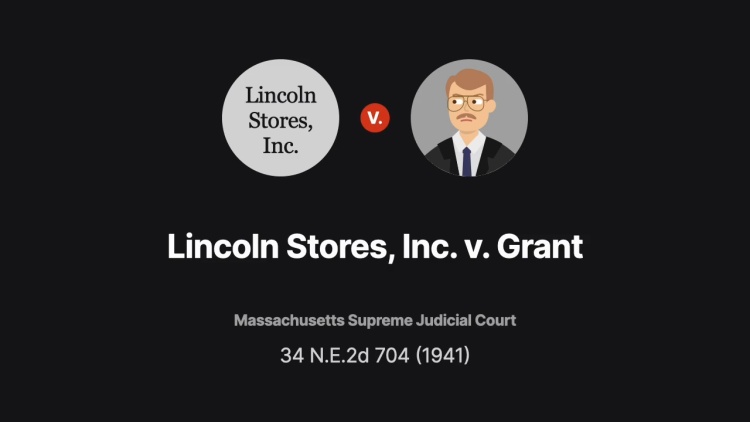Lincoln Stores v. Grant
Massachusetts Supreme Judicial Court
34 N.E.2d 704 (1941)
- Written by Daniel Clark, JD
Facts
Lincoln Stores, Inc. (the company) (plaintiff) operated a store in Norwich, Connecticut. The store was successful but limited by its small selling space. The company’s directors considered exercising an option that would allow the company to lease more space but ultimately decided to let the option expire. Ninety feet away from the company’s Norwich location was a department store run and owned by the Reid & Hughes Company. The department store did not compete with the company’s store, and at no point was it contemplated that it would be in the company’s expectation or interest to acquire the department store. Five years after the company’s decision not to exercise the option to expand its Norwich location, two of the company’s directors, Grant and Martin, and one of its employees, Haley (defendants), learned of an opportunity to purchase stock in the Reid & Hughes department store. Grant, Martin, and Haley charged their expenses related to pursuing the acquisition to the company and eventually purchased the shares in their individual capacities. Grant, Martin, and Haley concealed their acquisition of the department store from the company and used confidential company information to operate the department store in competition with the company’s Norwich location. The company sued Grant, Martin, and Haley, seeking both damages and an injunction that would place their Reid & Hughes shares in a constructive trust for the benefit of the company. A master awarded damages to the company but declined to form the constructive trust. The company appealed.
Rule of Law
Issue
Holding and Reasoning (Cox, J.)
What to do next…
Here's why 907,000 law students have relied on our case briefs:
- Written by law professors and practitioners, not other law students. 47,100 briefs, keyed to 996 casebooks. Top-notch customer support.
- The right amount of information, includes the facts, issues, rule of law, holding and reasoning, and any concurrences and dissents.
- Access in your classes, works on your mobile and tablet. Massive library of related video lessons and high quality multiple-choice questions.
- Easy to use, uniform format for every case brief. Written in plain English, not in legalese. Our briefs summarize and simplify; they don’t just repeat the court’s language.





